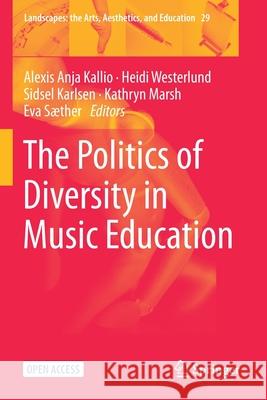The Politics of Diversity in Music Education » książka



The Politics of Diversity in Music Education
ISBN-13: 9783030656195 / Angielski / Miękka / 2022 / 226 str.
The Politics of Diversity in Music Education
ISBN-13: 9783030656195 / Angielski / Miękka / 2022 / 226 str.
(netto: 153,68 VAT: 5%)
Najniższa cena z 30 dni: 154,18
ok. 16-18 dni roboczych.
Darmowa dostawa!
1 Introduction.- Part 1 Exploring the politics of inquiry in music education research.- 2 The art(s) of getting lost: Halting places for culturally responsive research methods.- 3 Body politics: Positioning the pregnant researcher amongst asylum seekers.- 4 The politics of reflexivity in music teachers' intercultural dialogue.- 5 Doing dirty work: Listening for ignorance amongst the ruins of reflexivity in music education research.- Part 2 Navigating shifting political landscapes of society and state.- 6 Educative power and the respectful curricular inclusion of Aboriginal and Torres Strait Islander music.- 7 To "move, surprise and thrill": Thirty years of promoting cultural diversity in Norwegian school concerts.- 8 The challenges of implementing diverse political directives in contemporary China: Between creativity and Confucianism.- 9 "Where the social stigma has been overcome": Musician-teachers negotiating identity and place in Nepali society.- Part 3 Extending the scope of diversity in music education.- 10 The paradox of democracy in popular music education: Intersectionalizing "youth" through curriculum analysis.- 11 Where does diversity go straight? Biopolitics, queer of color critique, and music education.- 12 Cultural diversity, ecodiversity, and music education.- Part 4 Reconsidering the politics of music education leadership.- 13 From a different place to a third space: Rethinking international student pedagogy.- 14 Internationalization, hegemony and diversity: In search of a new vision for the global music education community.- 15 The politics of intercultural collaboration in higher music education: Challenges seen from a leadership point of view.
Alexis Anja Kallio is Senior Lecturer of Music and Research at the Queensland Conservatorium of Music, Griffith University. Her research investigates the politics of music education, with a particular focus on diversity and equity issues. She is editor of Difference and Division in Music Education (2020) and co-editor of Music, Education, and Religion: Intersections and Entanglements (2019).
Heidi Westerlund is Professor at the Sibelius Academy, the University of the Arts Helsinki where she also serves as head of music education doctoral studies. She is PI of Global visions through mobilizing networks; The Arts as Public Service: Strategic Steps towards Equality (ArtsEqual); and Co-investigator in Music for social impact. Westerlund has published widely, serves on several editorial boards and is the editor-in-chief of the Finnish Journal of Music Education.
Sidsel Karlsen is Professor of Music Education at the Norwegian Academy of Music where she is one of the leaders of the Centre for Educational Research in Music, and docent at the University of the Arts Helsinki. She is PI of Global visions through mobilizing networks. Karlsen has published widely in international research journals, anthologies and handbooks and serves on several international editorial boards.
Kathryn Marsh is Professor Emerita at Sydney Conservatorium of Music, University of Sydney. She has been the editor of Research Studies in Music Education and Visiting Fellow at the Universities of Oxford, London and Washington. She is author of the award winning (2008) book The Musical Playground: Global Tradition and Change in Children’s Songs and Games (OUP).
Eva Sæther is Professor in Music Education at Lund University, Malmö Academy of Music (MAM), and docent at the University of the Arts Helsinki. Her research focuses on intercultural perspectives on musical learning and creativity(ies). She teaches in the music teacher education program, and leads the research education in music education at MAM.
This open access book examines the political structures and processes that frame and produce understandings of diversity in and through music education. Recent surges in nationalist, fundamentalist, protectionist and separatist tendencies highlight the imperative for music education to extend beyond nominal policy agendas or wholly celebratory diversity discourses. Bringing together high-level theorisation of the ways in which music education upholds or unsettles understandings of society and empirical analyses of the complex situations that arise when negotiating diversity in practice, the chapters in this volume explore the politics of inquiry in research; examine music teachers’ navigations of the shifting political landscapes of society and state; extend conceptualisations of diversity in music education beyond familiar boundaries; and critically consider the implications of diversity for music education leadership. Diversity is thus not approached as a label applied to certain individuals or musical repertoires, but as socially organized difference, produced and manifest in various ways as part of everyday relations and interactions. This compelling collection serves as an invitation to ongoing reflexive inquiry; to deliberate the politics of diversity in a fast-changing and pluralist world; and together work towards more informed and ethically sound understandings of how diversity in music education policy, practice, and research is framed and conditioned both locally and globally.
1997-2026 DolnySlask.com Agencja Internetowa
KrainaKsiazek.PL - Księgarnia Internetowa









